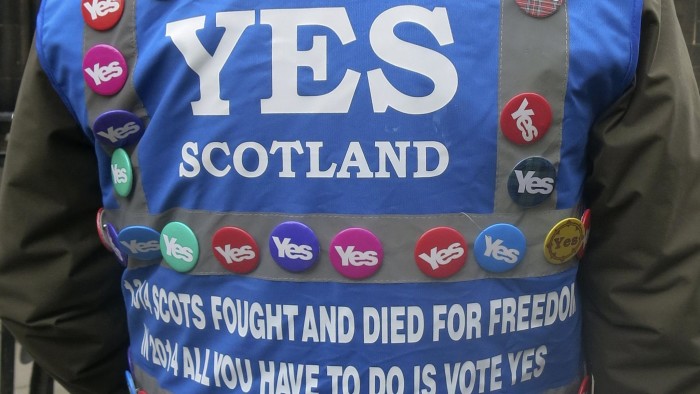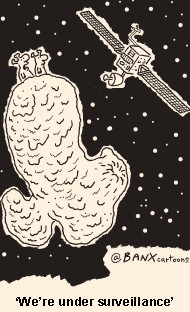History lesson from a Scottish declaration

Roula Khalaf, Editor of the FT, selects her favourite stories in this weekly newsletter.
“Don’t believe everything you read,” whispers the gentleman in the tartan waistcoat. I am perusing the information panels at Arbroath Abbey, the medieval monastery associated with the most famous document in Scottish history. In April 1320 what became known as the Declaration of Arbroath was sent from here to Pope John XXII. Written (probably) by the Abbot, Bernard, on behalf of nobles who supported the excommunicated king, Robert the Bruce, the letter asserted Scotland’s independence from the England of Edward II. It states: “It is in truth not for glory, nor riches, nor honours that we are fighting, but for freedom alone, which no honest man gives up but with life itself.”
These words stir the passions of Scottish patriots. They support the idea that the UK is a mere interval in the sovereign drama of Scottish history, one that may yet end if Scots were to vote Yes in the independence referendum on September 18. They are printed on tea towels that can be bought for £5.50 in the gift shop.
But the furtive employee of the Historic Scotland tourist agency, who insists on anonymity, explains to me that the declaration is more than a proto-nationalist edict. It is an exemplar of crafty diplomacy. “The Pope was the UN of his day,” my whispering guide says. Scots nobles needed to appeal to him to be recognised as independent and Bruce wanted the excommunication lifted so he could end up in heaven.
“It was lobbying,” the man says, adjusting his matching tartan tie. The letter is replete with classical and biblical references to appease the papal ego. It also appeals to the pontiff’s sense of realism. Pope John sought to unite Christians for the Crusades. “It was blackmail,” the guide adds. “The letter says we won’t fight until we’re sovereign.”
The declaration also contains what was a novel caveat from the nobles, one that some historians believe represents a kernel of constitutional democracy. The original is in Latin, so let the tartan whisperer translate: “If the king is rubbish we’ll chuck him out.” The Scottish nobles’ missive says that the monarch would be jettisoned if he did not protect their status. So much for the divine right of kings. This may have been only a monumental bluff but it influenced Thomas Jefferson, among others, according to my new friend.
Sovereignty. Freedom. Politicking. Democracy. Bluff. To think, there are people who believe that Scotland’s independence campaign only began in earnest at Tuesday night’s television debate.
The harbour sage
At Arbroath harbour, near where haddocks are hung and smoked on racks like medieval traitors, I chat to Bill Adam, owner of a local bed and breakfast. Stout and gruff with a faded thistle tattoo on his right forearm, Bill was born near Arbroath in 1951. After a childhood spent in foster and care homes, he escaped to London when he was 17.
Exile has never presented Scots with the existential angst that it gave the Irish. There is no Scottish equivalent of the fiery debate between WB Yeats and James Joyce on whether to stay or go, the embers of which continue to scorch Irish society. From James Boswell to Gordon Brown, Scots in London have often been successful. And these are only the ones you hear about.

When he arrived in the capital, Bill slept in doorways, picking up odd building jobs. After a few years he had made enough money to open a cafe on Drury Lane in the early 1970s, when Covent Garden was still a wholesale market. He used the profits from the cafe to open a nightclub, where he says Elizabeth Hurley once worked. There were ups and downs – failed ventures, bad property deals, the reluctance of wider culture to embrace garage music as the future of sound – but by the turn of the century he had made enough to buy his dream: the terraced house on Arbroath harbour that he and his wife had admired on many summer holidays in the town. Today it is Arbroath’s best B&B.
I ask Bill about independence. “It’s just so complicated,” he sighs. He wants someone to tell him about the economic consequences of his vote.
What about identity, I ask? Should I take his homecoming as a sign of his nationalist sentiment? “I’ve never needed that identity,” Bill says, recounting his rags-to-riches tale. “You don’t need a country to give you your identity – understand that and you’re already independent.”
Remember this harbour sage, I tell myself. In this year of all years, it is worth minding that identity need not come from kin or country. It can, indeed should, come from within.
Twitter: @johnpmcdermott
Comments